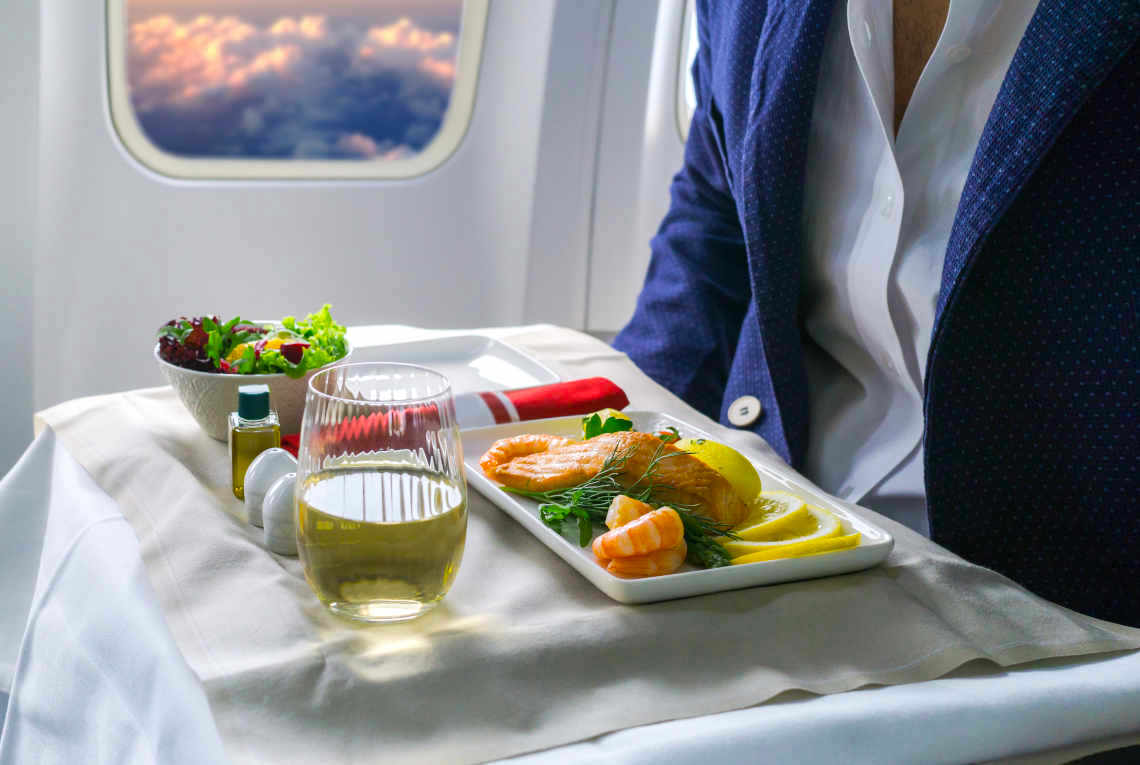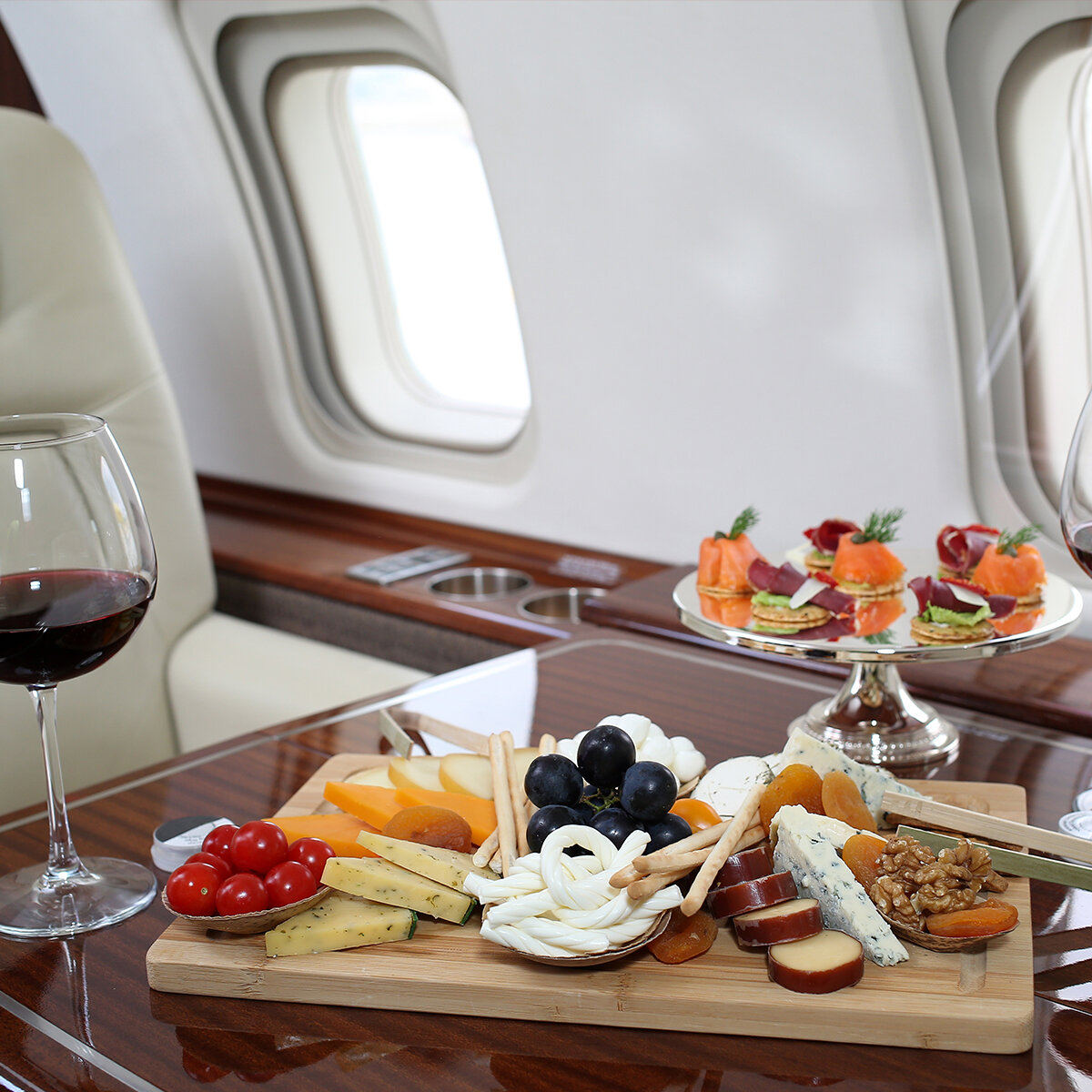
Although there are many jokes about airline food quality, Airlines invest a lot of time and resources into researching and designing the meals they serve their passengers. However, despite the investments, certain food items will rarely, if ever, make it on your next flight. Our perceived change in taste, costs, efficiencies, and regulations play a significant part in why certain foods are not served on planes.
Eliminated In-flight meal
According to a Business Insider article, ten food items are rarely on an airline menu.
- Soufflé
- Omelettes
- Toast
- Durian
- Foods with Molecular Gastronomy
- Pungent Cheeses
- Peanuts
- Sushi
- Hyper-Local Delicacies
- Buttery Foods

Flight meal Preparation Difficulties
Certain foods like soufflés and toast are challenging to prepare, so they are not served on planes. Soufflés, an already notoriously tricky dessert to make in everyday environments, will have a meagre chance of surviving the process of making it on a plane.
Since airline meals are typically prepared 12 to 24 hours ahead of time, chilled, and transported near an airport to load onto different planes, meals must survive the journey to your seat. As for items like toast and eggs, their shelf life is short, making it challenging to prepare and serve on a flight.
:max_bytes(150000):strip_icc()/emirates-business-class-dining-EMIRATESBIZ0322-e8414f0893f640929ea0cb2d286d8e61.jpg)
As for local delicacies such as Iceland's fermented shark fin, they are relatively obscure and, therefore, too difficult to prepare on a massive scale. Since managing costs and efficiency is crucial to an airline's bottom line, they will rarely, if ever, serve obscure local delicacies. However, airlines still work hard to cater meals to their passengers on international flights. For instance, airlines typically offer Western and Korean meals to appease passengers on a flight from the United States to South Korea.
Scents and Sogginess
Foods with strong smells, such as pungent cheeses and durian, are not served due to airlines' fears of offending passengers with these scents. Although our tastebuds would benefit from consuming foods with more pungent smells and tastes in the air, the scents polarize passengers.
Durian, a fruit popular in Southeast Asia, underscores the issue with polarizing scents. While many people love the smell and taste of durian, many others cannot handle it. It is so offensive that some countries have banned the fruit from public areas.

Foods and sauces with lots of butter and oil tend to get soggy at high altitudes, making it a less desirable option to serve passengers. A United Airlines spokeswoman, Karen May, confirmed that United does not serve fried foods on their flights. So, you will not soon see fries, fried chicken, and pizza on your flight.
Allergies and Risks
Ever wonder why your airline has stopped serving peanuts? It is simply to reduce risks for the airline and its passengers. As childhood peanut allergies have increased by 21% since 2010, airlines decided it would be better to keep peanuts out of their planes to accommodate passengers with deadly allergies.

Cooked fish is already a logistical challenge for many airlines, which explains why eating fish on a plane is rare. However, raw fish such as sushi are a logistical nightmare for airlines. Raw fish must be delicately prepared to ensure a high-quality passenger experience, making it nearly impossible to serve thousands of passengers daily. Additionally, raw fish require special training and equipment to serve, a cost that airlines do not need to take on.
Why British Airways BA274 Braved the Atlantic After Losing a Tire » East Asian Aviation Crisis Deepens as China Suspends 49 Major Air Routes to Japan Amid Diplomatic Tensions » U.S. Greenlights Final Certificate Transfer Between Mesa and Republic Airways »
Comments (0)
Add Your Comment
SHARE
TAGS
INFORMATIONAL Flight Flight kitchen Flight meal meal In flight mealRECENTLY PUBLISHED
 American Airlines Plans Full Widebody Free Wi-Fi Expansion After Internal Meeting Leak
A leaked recording from a recent American Airlines employee meeting has revealed that the carrier intends to equip its entire widebody fleet with free high-speed Wi-Fi. As of February 2, 2026, the carrier is moving to close the gap on its long-haul international product, expanding the AT&T-sponsored service that debuted on domestic routes just last month.
STORIES
READ MORE »
American Airlines Plans Full Widebody Free Wi-Fi Expansion After Internal Meeting Leak
A leaked recording from a recent American Airlines employee meeting has revealed that the carrier intends to equip its entire widebody fleet with free high-speed Wi-Fi. As of February 2, 2026, the carrier is moving to close the gap on its long-haul international product, expanding the AT&T-sponsored service that debuted on domestic routes just last month.
STORIES
READ MORE »
 Air India Pulls Boeing 787-9 From Service After Serious Fuel Switch Discrepancy Report
Air India has taken the preemptive step of grounding one of its Boeing 787-9 Dreamliners following a technical report involving a critical fuel control switch malfunction. The decision, confirmed today, February 2, 2026, underscores the carrier’s heightened focus on safety and operational integrity as it continues its massive fleet transformation under the Tata Group.
STORIES
READ MORE »
Air India Pulls Boeing 787-9 From Service After Serious Fuel Switch Discrepancy Report
Air India has taken the preemptive step of grounding one of its Boeing 787-9 Dreamliners following a technical report involving a critical fuel control switch malfunction. The decision, confirmed today, February 2, 2026, underscores the carrier’s heightened focus on safety and operational integrity as it continues its massive fleet transformation under the Tata Group.
STORIES
READ MORE »
 FedEx Targets May 31 Return for MD-11 Fleet Following Fatal November Crash
A stark divide has emerged between the world’s two largest logistics giants as they navigate the future of the iconic McDonnell Douglas MD-11 freighter. While FedEx Express is doubling down on the trijet with a target return-to-service date of May 31, 2026, United Parcel Service (UPS) has officially closed the book on the aircraft’s thirty-year tenure following a devastating accident that sent shockwaves through the industry.
STORIES
READ MORE »
FedEx Targets May 31 Return for MD-11 Fleet Following Fatal November Crash
A stark divide has emerged between the world’s two largest logistics giants as they navigate the future of the iconic McDonnell Douglas MD-11 freighter. While FedEx Express is doubling down on the trijet with a target return-to-service date of May 31, 2026, United Parcel Service (UPS) has officially closed the book on the aircraft’s thirty-year tenure following a devastating accident that sent shockwaves through the industry.
STORIES
READ MORE »



